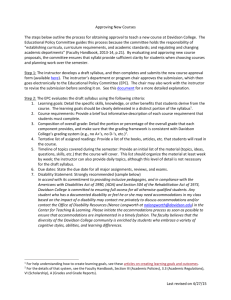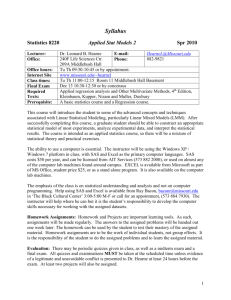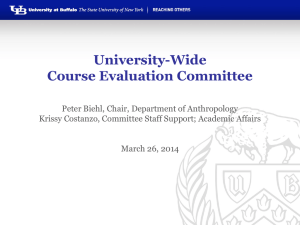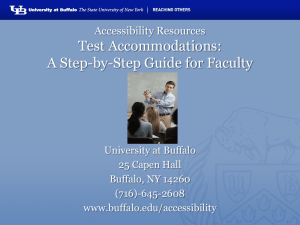Fine Arts Procedures for Students with Special
advertisement
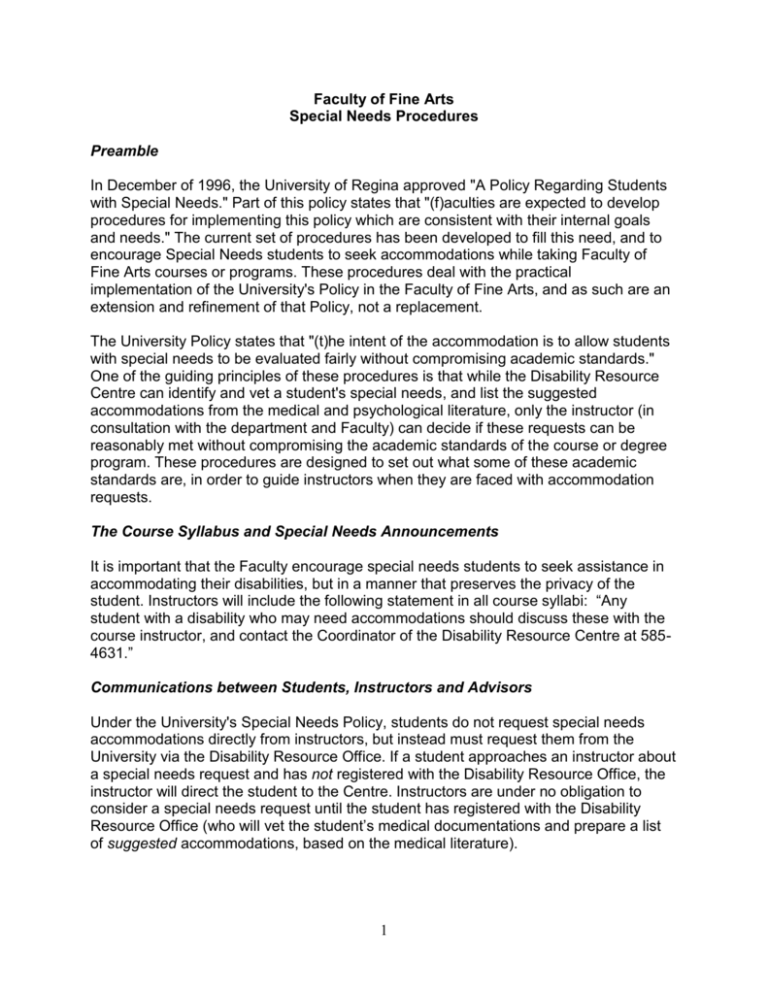
Faculty of Fine Arts Special Needs Procedures Preamble In December of 1996, the University of Regina approved "A Policy Regarding Students with Special Needs." Part of this policy states that "(f)aculties are expected to develop procedures for implementing this policy which are consistent with their internal goals and needs." The current set of procedures has been developed to fill this need, and to encourage Special Needs students to seek accommodations while taking Faculty of Fine Arts courses or programs. These procedures deal with the practical implementation of the University's Policy in the Faculty of Fine Arts, and as such are an extension and refinement of that Policy, not a replacement. The University Policy states that "(t)he intent of the accommodation is to allow students with special needs to be evaluated fairly without compromising academic standards." One of the guiding principles of these procedures is that while the Disability Resource Centre can identify and vet a student's special needs, and list the suggested accommodations from the medical and psychological literature, only the instructor (in consultation with the department and Faculty) can decide if these requests can be reasonably met without compromising the academic standards of the course or degree program. These procedures are designed to set out what some of these academic standards are, in order to guide instructors when they are faced with accommodation requests. The Course Syllabus and Special Needs Announcements It is important that the Faculty encourage special needs students to seek assistance in accommodating their disabilities, but in a manner that preserves the privacy of the student. Instructors will include the following statement in all course syllabi: “Any student with a disability who may need accommodations should discuss these with the course instructor, and contact the Coordinator of the Disability Resource Centre at 5854631.” Communications between Students, Instructors and Advisors Under the University's Special Needs Policy, students do not request special needs accommodations directly from instructors, but instead must request them from the University via the Disability Resource Office. If a student approaches an instructor about a special needs request and has not registered with the Disability Resource Office, the instructor will direct the student to the Centre. Instructors are under no obligation to consider a special needs request until the student has registered with the Disability Resource Office (who will vet the student’s medical documentations and prepare a list of suggested accommodations, based on the medical literature). 1 Students are expected to approach the Disability Resource Office with their Special Needs requests in a timely mannerstudents will normally contact the Office before the beginning of class when making Special Needs requests. If a student has already done some of the work in the class before seeking special needs accommodations, the grades from the completed material will not be changed. The one exception to this timeliness rule is when there are extenuating delays due to problems in getting the documentation prepared or vetted. Instructors can then contact the Disability Resource Office to make sure that the requests are being considered, and then should proceed as if the request has been approved until they hear otherwise. It is important that students keep their advisors informed as to their special needs status. Specifically: a) students will keep their academic advisors informed of their Special Needs situation in any advising meeting. b) students will see both a departmental advisor about their major, and a Faculty (or College) advisor about their degree requirements. Upon receiving a request from the University’s Disability Resource Office for accommodations to be made for a student, the instructor shall write back to the student, copying the Disability Resource Office and the Dean and/or Assistant Dean of the Faculty of Fine Arts, and indicating the following: a) the date upon which the special needs request was received by the instructor. b) the fact that these issues have been discussed with the student. c) what accommodations have or have not been agreed upon by the instructor, what accommodations will be made and how these might diverge from the letter requesting those accommodations. The instructor may request assistance from the Dean and/or Assistant Dean of the Faculty of Fine Arts at any time, but must discuss the special needs requests with the Dean and/or Assistant Dean in the following circumstances: a) the instructor feels compelled to refuse to meet the special needs request of the student, and is unable to suggest an accepted alternative to the student. b) meeting the special needs request will require the Faculty to spend extra money for equipment, staffing or other purposes. c) the instructor and the student are unable to agree on whether or how the student's special needs are being met. If the Dean and/or Assistant Dean, instructor and student cannot arrive at an acceptable accommodation, the University Policy states that the student may seek mediation from Student Affairs in the first instance. If this mediation does not lead to agreement, the matter is referred to the Vice-President (Academic) for a decision. 2 Taping of Lectures and Seminars Special Needs students frequently require help with note taking. Students can request access to lecture material; it is up to the instructor to decide if he or she wishes to provide copies of lectures notes. If taping of lectures or seminars is the only viable option, then this request will be met. The method of accessing these tapes will be at the discretion of the instructor. The instructor will advise the class that taping is occurring. In addition, the student who is requesting the taping must agree in writing not to use the tapes except for the purpose of studying the class, and to erase the tapes after the course ends. The instructor will convey this requirement to the student in writing. Students who tape lectures are expected to attend them as well. Accommodations in Evaluating Special Needs Students The University's Special Needs Policy is designed to give Special Needs students an equal chance to show their academic ability without compromising academic standards. Sometimes, required academic standards mean that students will have to attempt to complete a required component of a class (potentially with the help of tutors, etc.), or avoid that class in their program selection. On the other hand, sometimes instructors will need to design alternate methods of testing whether or not students meet the academic standards needed to pass the class or achieve a specific standing. These alternatives might include substituting different types of written exams, or substituting exams for essays, or essays for exams, depending on the student's disability. Perhaps the best way of understanding the differences in the two approaches above is to consider what the evaluation is testing. If the evaluation is testing the students' knowledge of the course subject matter, then a variety of methods are available for such testing, and requests for substitution are reasonable. If the evaluation is testing (in whole or in part) the student's expository skills (written or oral), then there might be only a limited set of ways of doing this, and the requests for substitution may have to be refused. To summarize, if alternate evaluation methods are available and do not compromise academic standards, instructors will provide them in response to Special Needs requests. In many cases, the Special Needs request involves relatively minor accommodations such as requesting extra time for exams or in-class assignments, or a separate room to write in, or special typeface or coloured paper. The instructor will be expected to meet such minor accommodations. Students are expected to confirm these accommodations at least a week before any examinations. Some of these requests will lead to extra work for specific instructors or departments. The instructor's department (through the help of the head and administrative staff) and the Faculty of Fine Arts (through the help of the Dean and/or Assistant Dean and the Faculty Administrator) will work with the instructor to help reduce this workload. 3 Requests for Exemptions from Degree Requirements Occasionally disabled students request exemption from specific degree requirements. Requests for exemptions from specific degree requirements will be addressed to the Faculty of Fine Arts Student Appeals Committee or the Admissions, Studies and Procedures Committee. The following conditions will apply: a) The Committee will generally expect the student to attempt the course (with appropriate accommodations) at least once before considering the request. While taking the course, the student and their academic advisor will monitor the student's progress, and the student will be encouraged to drop the course before the final drop date if failure seems likely. b) The Committee will require documented medical evidence linking the student's disability to the specific course. c) If satisfied that the request is reasonable and that academic standards are not unduly compromised, the Committee will approve a substitute course in the student's program. d) English 100 and 110 cannot be substituted, although efforts will be made to accommodate disabled students where appropriate. Draft February 6, 2003 4

